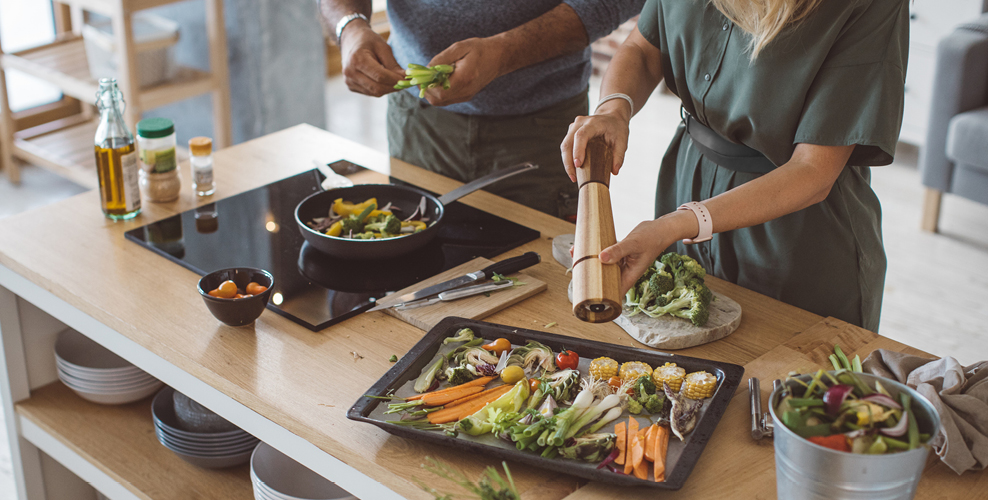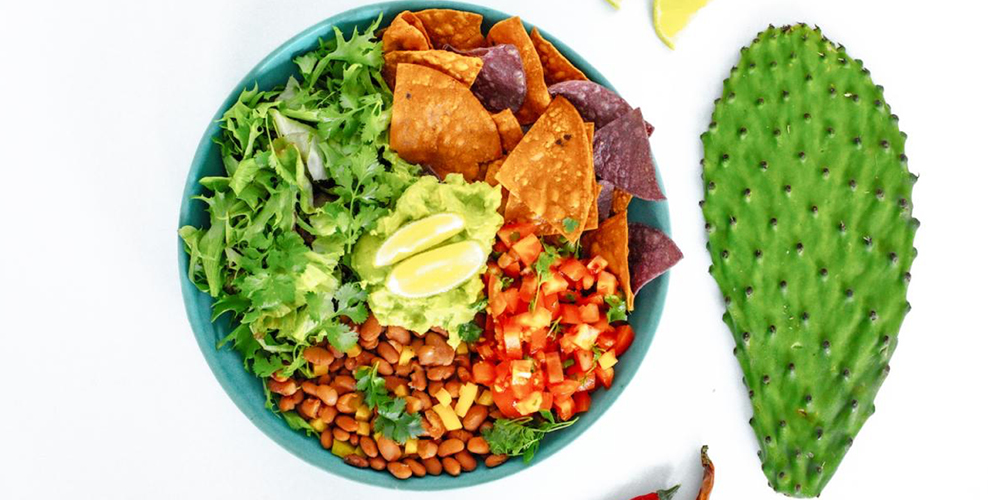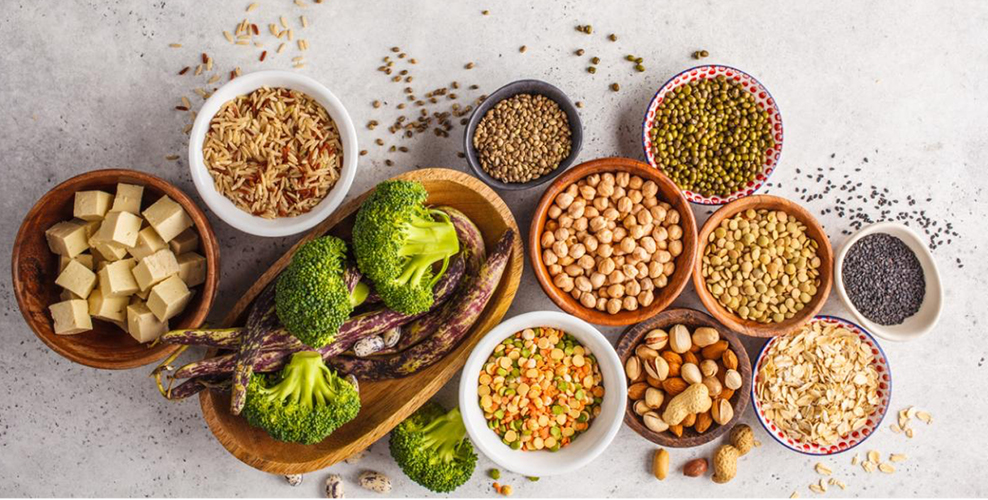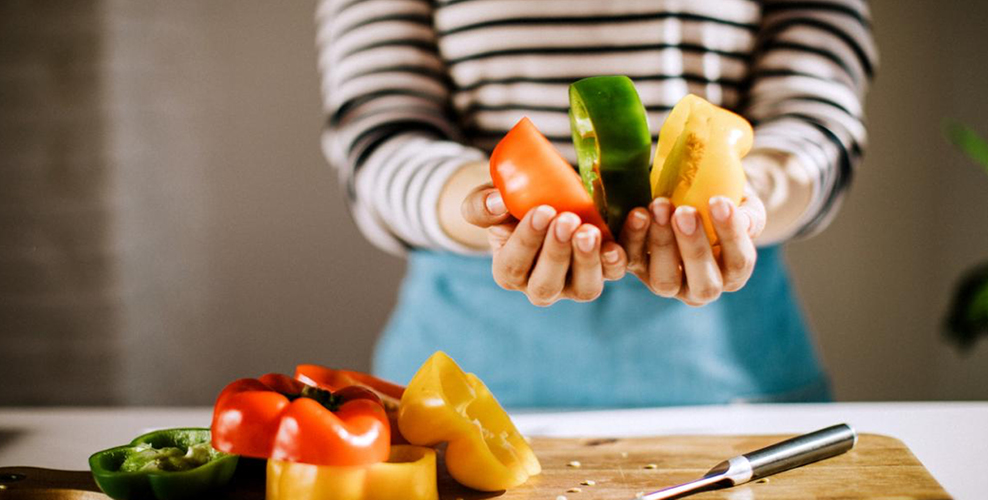Plant-based diets - how to make the switch and why you should

Plant-based vs vegan - what's the difference?
You might have heard the terms 'plant-based' and 'vegan' used interchangeably, and they are similar. Both plant-based and vegan diets contain no animal products. So that's no meat, fish, dairy or eggs. Some people also remove honey from their diet.
The difference between the two terms is that someone who eats a plant-based diet only avoids eating animal products. Vegans do that too, but also avoid animal cruelty in all areas of their lives - for example they don't wear leather or use beauty products tested on animals.
How far you want to go is up to you. Whether you become completely vegan, enjoy a plant-based diet, or just start with meatless Mondays, there are many benefits for your health and the health of the planet.
Health benefits of a plant-based diet
Healthy heart
Switching to a plant-based diet could help you lower your blood pressure1 and reduce your risk of heart disease.2,3
Lower blood pressure and reduced risk of heart disease adds up to a healthier heart - simply by switching out animal products for plant-based alternatives.
Better blood sugar control
Your brain runs on sugar. No, not just lollies and cake, but the glucose that makes up all the carbohydrates you eat. If your blood sugar becomes too low, you may feel sluggish and tired. Over time when blood sugar is consistently too high it can contribute to developing diabetes, inflammation or heart disease.
Eating a plant-based diet can help your body keep your blood sugar in the sweet-spot, not too high and not too low.4,5
Increased fibre
One thing that will almost certainly happen if you eat more plants is that you'll eat more fibre.
Fibre is the part of plants that you can't digest, but that's extremely good for you. It keeps you regular, and that's great for your gut. People who eat more fibre have a lower risk of bowel cancer.6,7
Eating more fibre can also cause beneficial changes to the bacteria in your stomach (also known as your bowel microflora or microbiome), increasing the levels of good bacteria.8,9
Lower levels of inflammation
The standard Western diet tends to promote inflammation in our bodies. Many modern diseases are due to chronic (long lasting) inflammation, so it's important to try and reduce it any way we can. Healthy plant-based diets are naturally anti-inflammatory, helping to protect you and lower your risk of disease.10
Lower body fat
Plant-based diets could lower your body fat - and importantly, decrease the more dangerous fat around your organs.11,12
Environmental benefits
A plant-based diet isn't just good for you - it's also good for the planet. Plant-based diets result in fewer greenhouse gas emissions, need less energy, take up less farming land and use less water.13-15
Getting started with a vegan or plant-based diet

Ready to get started with a plant-based diet? There are a few things you'll want to do first.
- Pick a date: It doesn't have to be a Monday or the 1st of the month to get started. Deciding to start two-to-three days ahead gives you time to finish up the eggs and stock up on the essentials.
- Find some yummy recipes: Search through some websites or cookbooks and find some exciting things to cook. Take a look at this Protein-packed Mexican bean bowl to whet your appetite!
- Clear out your kitchen: To avoid waste, try to use up any meat, dairy and eggs before you make the switch. Check the ingredients lists of the foods in your fridge or pantry to unearth any hidden animal products like milk powder or meat stock. If you live with other people who aren't ready to make the switch, skip this step!
- Go shopping: Head to the greengrocer's or grower's market and pick up some plant-based versions of your favourite foods. See the shopping list below for some basics to get you started!
- Enjoy your new plant-based diet!
Shopping list
- A milk alternative like soy, almond or oat milk
- Canned or dried beans: try chickpeas, borlotti, kidney or pinto beans. (TIP: The canned options take less time to prepare, but should be rinsed carefully first)
- Tofu and/or tempeh
- Nuts and seeds: choose a variety to optimise the range of nutrients they provide
- Plenty of fruit and veg
- Also consider plant-based meat alternatives like vegan sausages or burgers - although they're processed, they can help to ease the transition away from meat
Key nutrients to consider on a plant-based diet

Some nutrients are more difficult to get from plant-based foods than they are from animal foods - but it's not impossible to have a healthy, nutritious vegan diet. Just keep these key nutrients in mind:
Vitamin B12
You need this vitamin to make healthy red blood cells. It's only found in animal products, but it's actually made by bacteria. This means it's easy to find foods fortified with a vegan source of vitamin B12. Good options include:
- Some milk alternatives
- Soy products
- Nutritional yeast
- Some yeast spreads
Check the labels to be sure!
Iron
Iron is also necessary for making red blood cells, and if you don't get enough you may start to feel tired. Luckily, there are many ways to get iron in a plant-based diet!
- Green leafy vegetables
- Tofu
- Beans and lentils
- Nuts and seeds
- Dried fruit.
To increase the amount of iron your body absorbs, have these foods with vitamin C (orange juice, citrus fruits, capsicum and kiwi are great sources).
Calcium
To have strong bones, you need enough calcium. Most people rely on dairy for the majority of their calcium intake, but there are plenty of plant-based options too.
- Soy products
- Beans and lentils
- Kale
- Fortified dairy-free milks
You don't need to overthink it. Eating a well-rounded diet with a variety of foods should mean you get enough of all the vitamins and minerals you need to keep your body healthy.
The takeaway
Choosing to start a plant-based diet doesn't need to be overwhelming. With a little preparation, it's easy to make this way of eating work for you.
Give it a try. Your body will thank you for it.
Written by Amy Butler [BSc(Hons)Nut / Nutritionist]
References
- Abbasnezhad, A. et al. Diab Res Clin Prac, 2020;163:108108.
- Heianza, Y. et al. Am J Clin Nutr, 2020;00:1-9.
- Jakše, B. et al. Nutrients, 2020;12:55.
- Salas-Salvadó, J. et al. Adv Nutr, 2019;10(Suppl_4):S320-S331.
- Barbosa de Carvalho, G. et al. Crit Rev Food Sci Nutr, 2020;60(12):1999-2010.
- Ocvirk, S. et al. Curr Gastroenterol Rep, 2019;21(11):62.
- Wilson, A.S. et al. Dig Dis Sci, 2020;65(3):723-740.
- Cantu-Jungles, T.M. & Hamaker, B.R. mBio, 2020;11(1):e02179-19.
- Holscher, H.D. Gut Microbes, 2017;8(2):172-184.
- Margina, D. et al. Int J Environ Res Public Health, 2020;17(11):4135.
- Campbell, E.K.et al. Nutrients, 2019;11(9):2068.
- Ratjen, I. et al. Am J Clin Nutr, 2020;112(2):354-363.
- Chai, B.C. et al. Sustainability, 2019;11:4110.
- Rabès, A. et al. Sustain Prod Consum, 2020;22:138-146.
- Mekonnen, M.M. & Fulton, J. Water Int, 2018;43(6):860-870.

















